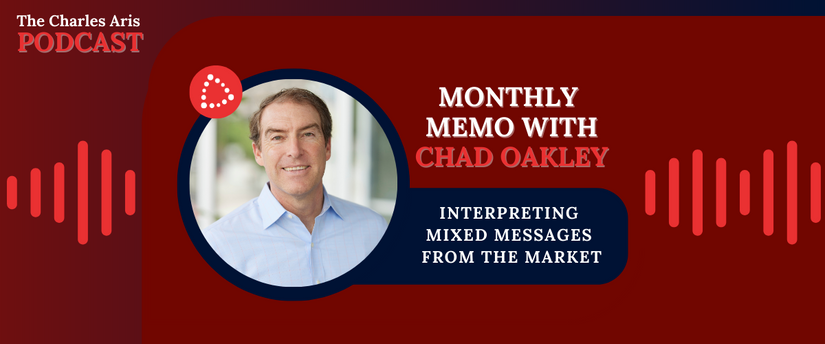The Monthly Memo with CEO Chad Oakley: July 2023

In this episode, Charles Aris CEO Chad Oakley examines talent trends we saw in June and answers one of the most frequently asked questions in the marketplace.
Read the full transcript:
Hello everyone and welcome to the Monthly Memo from Charles Aris Executive Search, where we share the latest trends in talent and recruiting. I’m your host, Chad Oakley, chief executive officer of Charles Aris Executive Search. I hope that you are all enjoying your summers.
The US Bureau of Labor Statistics released their monthly jobs report. We’ll give you a quick reaction to that report and what we’re seeing in the marketplace here at Charles Aris, and then we’ll answer a popular question that we are hearing from the marketplace: Is it safe to change jobs when we might be heading into a recession? Lastly, we’ll wrap up with an interviewing best practice; we’ll tell you the worst possible question to ask if you’re interviewing for a job with a private equity firm. But first, let’s start with the jobs report.
Jobs report:
On Friday, 209,000 new nonfarm payroll jobs were added, and, once again, we have a very solid number, all things considered. Yes, believe it or not, 209,000 is the lowest amount of new jobs created by the US economy in the past (yikes!) 29 months. You have to go all the way back to December of 2020 to see a lower number. However, 209,000 is still a pretty good number. Also, I should mention the streak is finally broken. What I mean by that is the June report marked the first time in 14 months that the jobs report number came in below the consensus expectation from economists. Think about this for a second. It’s kind of incredible. We were on a streak of 13 straight months when the number of new jobs created was higher than the consensus estimate from economists, which shows that the economists were certainly more pessimistic, and it also shows the resiliency of this labor market, at least here in the states. The unemployment rate ticked down from 3.7% to 3.6%. That is slightly higher than the 50-year low that we saw just two months ago in April at 3.4%, however, 3.6% is still an incredibly low number as a historical figure. While these numbers may not be preferred by Jerome Powell and the Federal Reserve who are actively trying to increase the unemployment rate to stem the tide of inflation, if you are an employee in the USA, this continues to be pretty darn good news.
What this effectively means is that if you are seeking employment, there are plenty of jobs to be had. The other part of the good news, on the flip side of that coin, is that if you’re an employer who is actively trying to hire people for your team, with a little bit of patience, you’re probably able to find someone to fill the role. And that is a very significant improvement from where we were just a year ago when it was incredibly challenging to find and retain anyone. And to go along with that, the other piece of good news is that the quit rate is down. That’s right, I think it’s official, everyone. We can pretty much call the great resignation over and officially behind us.
Last year, as you guys know, the resignation rate was at its highest it has been in decades here in the United States. Now we’ve actually seen that number drop to just slightly higher than what it was pre pandemic, and that’s really good news for employers as well. Here at Charles Aris, we would say that the three best words to use to describe the current labor market are steady, balanced and dare I even say healthy. Two months ago on this very podcast, we talked a lot about how many technology companies were laying off thousands of employees at a time, if not some at 10s of thousands of employees, and that we thought it was likely that these layouts would spread to other industries, kind of one of those as goes technology, so goes the rest of the world type of things, right? Well, two months later today and we’re still not seeing those layoffs materialized, at least not in any significant manner.
In fact, here’s a little fun fact for you from Charles Aris. Right now, we’re retained on a little over 120 searches with 120 different clients, and we’ve only heard one of those 120 clients even whisper those two dreaded words that no executive recruiter ever wants to hear: hiring freeze. Only one out of 120. It is true that companies are hiring less than they have been over the previous 24 months, which is, you know, a result of a combination of things, including that reduced quit rate that we just talked about. But they are still hiring in select roles, so, at the end of the day, right now, if you want a job, you can find one, and if you need a new employee, you can find one. Steady, balanced and healthy. Fingers crossed we can keep it up.
OK, that’s our market update. Now let’s pivot to a question that we’re hearing quite a lot from candidates out in the marketplace:
Is it safe to change jobs when we might be heading into a recession?
First and foremost, let’s talk about the “R” word. Let’s talk about recession. I will say that, hey, four months ago, I was one of the many people in the United States convinced that we were headed towards a recession, and maybe even a pretty harsh one at that, unfortunately. Now I truly feel that there’s considerably less chance that we actually have a recession. I think that the movements by Jerome Powell and the Fed most likely led us to a soft landing, which would be an incredibly positive development, but everyone would agree that we’re not exactly out of the woods just yet. A recession certainly is still possible, which is leading a lot of people to ask that question of is it smart for me to change jobs when in fact a recession could occur?
Whenever there’s a question in the market, you have to ask yourself what’s driving it, right? So, what’s driving this question, of course, is fear: fear that employers will react to a downturn in their business, with a last-in first-out mentality when it comes to layoffs. In other words, if there is a significant recession and business drops and layoffs are required to maintain profitability, companies will start their layoffs with the most recent additions to their team. This is a totally understandable concern, but I do have good news and that is that it is incredibly uncommon for companies to lay off employees that they just recently hired, especially at the white-collar level at the executive ranks.
Now, at a blue-collar position, it could be quite different. You could see the last 10 being the first out because they just haven’t had a chance to learn the business and companies need to retain those individuals that know the business best. But at the white-collar levels, it really, really is incredibly uncommon. It’s just a terrible look in the marketplace that companies would really prefer not to engage in, especially in today’s day and age of social media. It’s just a really bad look. Furthermore, there’s just a lot of respect for people that have made these changes, right. There’s a guilt factor here, if you will, if you think about it, when you join a new company, you uproot a portion of your life in making that job change. You’ve taken a calculated risk. Companies appreciate that you’ve taken that risk and they don’t want to penalize you even during a recession. So, there is a very good likelihood that your position will be safe should your new employer fall on hard times. One last data point I’ll mention on this, another Charles Aris fact, is over the past 10 years we have not seen one of our placements get caught up in a layoff within their first year of employment, not even during the pandemic. That is a very good piece of anecdotal evidence to support our theory that odds are your job will be safe if a recession occurs.
What not to ask when interviewing with a private equity firm:
OK, now let’s pivot to our last question, which is the worst question you can ask when interviewing with a private equity firm. Half of the client base at Charles Aris are private equity firms and their portfolio companies. So, we work with a lot of the top firms in the marketplace. It is important to remember that the quality of questions that you ask during an interview process is extremely important. As we like to say at Charles Aris, you will be judged as much by the questions you ask as by the questions you answer. We most often talk about good questions that you should ask during an interview process, questions such as ‘what are the top two or three accomplishments that you need from this during the first 12 months’ or ‘what are the top two or three attributes that describe your top performers in your unique culture?’ Rarely, though, do we talk about bad questions to ask during the interview process, but, indeed, there are bad questions, and especially bad ones in certain industry types.
Now we’re talking about private equity, right? So, if you’re interviewing with a private equity firm, there is one question that is very taboo. And that question is: Tell me about my team. The question seems innocuous enough. Certainly, it’s one that you would ask in most interview settings, but it’s one that you want to steer clear of with private equity firms. The reason is because private equity runs lean and mean. The leaner the better. Private equity is all about doing more with less. I don’t really care if you’re interviewing with a private equity firm with one of their portfolio companies. Yes, even if you’re the CEO, of course you’re going to have a team, but I promise you that team will be much leaner than perhaps what you might be used to, unless you’re coming from another private equity firm. But if you’re joining a private equity firm itself, it can be incredibly lean. Leverage does not exist in private equity like it does in corporate America. We’ve seen many new private equity executives go from managing a team of hundreds in corporate America to managing a team of 0 in private equity. Yes, literally 0, just managing yourself as an individual contributor. Your sleeves will be rolled up above your elbows in private equity. As long as that is OK with you, then you’ll do just fine. But steer clear of that one question: Tell me about my team.
Thanks, everybody. I hope that this monthly memo has been helpful for all of our subscribers. This is CEO Chad Oakley saying thanks for listening and we’ll talk again next month. Happy recruiting, everyone!
SIMILAR ARTICLES
Meaningful conversations: How our deal-sourcing team connects with founders
We launched our transaction services business with the guiding philosophy that meaningful conversations lead to successful deals.
The new era of workplace wellness at Charles Aris
Throughout the past year, we’ve also integrated firmwide activities into our culture to promote healthy meditation, social events and exercise.
Charles Aris in the community
Our firm places a high value on giving back to our communities, and our team members have been working alongside several organizations to do so.


